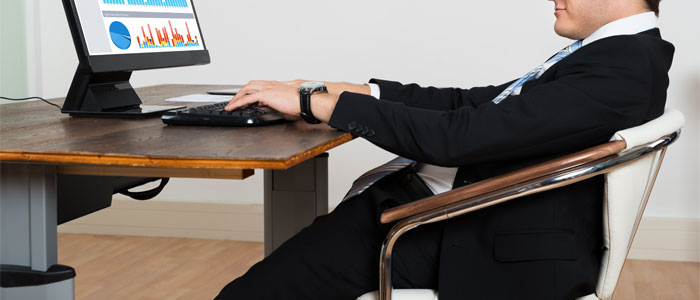Physical Effects of Posture

In our last blog post we discussed the psychological effects of posture as part of our campaign to promote posture awareness this May. In this blog post, we will focus on how posture affects our physical well-being.
Pain
While back, shoulder, and neck pain are commonly cited, poor posture can cause other types of pain as well. Poor posture overworks some muscles and bones and neglects others, causing straining, fatigue, and future difficulty maintaining good posture. Pain from this uneven distribution usually manifests itself throughout the back, neck, and shoulders, and is easily traced to poor posture. But the way you hold yourself can also constrict blood vessels and nerves around your spine, creating pinched nerves that send pain signals to other parts of your body. These may not be as easy to trace, but they are the result of poor posture just as much as back pain. Headaches are a common symptom of pinched nerves caused by a misalignment of the spine. Poor posture can even affect your stomach. Sitting slouched over puts pressure on the intestines, which makes it hard for them to do their job and may cause cramps and constipation. If you’re experiencing pain on a regular basis, you may find that improving your posture eliminates much of the discomfort.
Metabolism
If poor posture can cause stomach pain by interfering with your digestive system, it makes sense that posture can affect your metabolism as well. Simply standing instead of sitting burns more calories and boosts your metabolism, plus it strengthens your muscles and increases bone density. This means that not only are you giving your metabolism a boost in the moment, you are also increasing your body’s strength and ability to carry itself properly, so that you can make good posture an easier habit to adopt permanently.
Spinal Degeneration
Some spinal degeneration as we age is natural, but good posture can slow down that weakening and prevent serious back problems like bulging or herniated discs. Your spinal column is made of vertebrae and discs, with tendons and ligaments keeping everything together. The discs in your spine act as cushions for the vertebrae, giving you greater flexibility and ease of movement. The same positions that cause muscle straining and fatigue also put greater wear and pressure on the discs in your spinal column, and too much of this can cause them to slip, bulge, or even crack. This type of spinal degeneration can cause chronic pain, and also severely restricts your range of motion. Maintaining proper posture keeps your spine in good shape and better able to withstand the wear and tear of daily life.
Improving your posture for better physical health is something anyone can do with commitment and the right information. Practicing good posture is one of the best things you can do for your long-term health and quality of life, as it helps you to decrease pain, maintain general health, and delay or lessen the physical effects of aging. Try these tips for improving your quality of life through posture.
Tips
Try out pilates or yoga. These forms of exercise focus on awareness of your physical body, and can help improve your posture as you learn to pay attention to your body, breathing, and movements.
Set an alarm on your phone or use everyday cues like a color, word, or image to remind yourself either to stand up or realign your body. Posture is largely a habit, so the more you can remind yourself to hold your body in a healthy and comfortable position, the sooner it will come naturally.
Visit a chiropractor or physical therapist to learn how to do specific exercises and stretches that will strengthen your core muscles and improve your posture.
Sources:
- https://www.painpathways.org/overcoming-pain-poor-posture/
- https://www.prevention.com/life/g20471859/how-bad-posture-affects-your-health-and-happiness/
- https://radianthealthchiropractic.com/blog/poor-posture-leads-to-spinal-degeneration
Posted In:
Pain Management
General Health
Spinal Health
Metabolism
Posture
